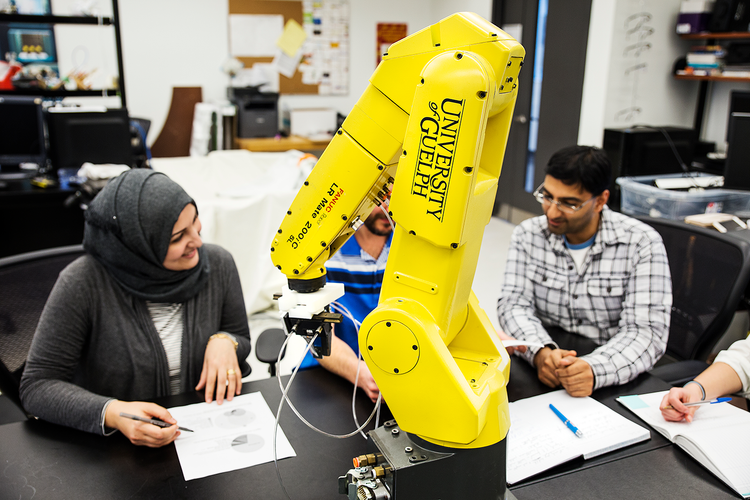
Master of Engineering (M.Eng.)
Elevate Your Career with Our M.Eng. Program
The University of Guelph is educating engineers who will shape our future. Our strengths lie in diverse, multi-disciplinary research and strong collaborations to solve complex challenges. Deliberately crafted to cater to both seasoned professionals and fresh graduates, our program offers a comprehensive exploration of eight distinct fields of study, providing a solid foundation for career growth and specialization. Our graduates apply the advanced technical expertise gained in the M.Eng. to excel in industry.
Cutting-edge Facilities & Resources
Access state-of-the-art software and research equipment for designing complex systems. Collaborate with expert faculty in your chosen field.
Global Appeal for International Students
Our M.Eng. program is highly sought-after by international students for its global appeal.
Diverse Industry Success by Alumni
M.Eng. grads thrive in various industries worldwide, from Linamar Corporation to Google, and our proximity to Toronto unlocks industry opportunities.
Discover our Distinct M.Eng. Programs
Master of Engineering students will follow the curriculum pathways as illustrated below. Please follow the link provided for your specific field of study.
The Biological Engineering discipline within the U of G M.Eng. program applies principles of biology and engineering, and includes biochemical, food or biomaterials engineering.
A Master’s in Biological Engineering opens doors to diverse career paths in industries ranging from healthcare to environmental management. Graduates are equipped to design solutions for complex biological and environmental challenges, develop innovative biotechnologies, and advance sustainable practices across sectors. With skills in advanced engineering, data analysis, and bio-instrumentation, biological engineering professionals are well-suited to roles that impact public health, agriculture, and technology.
Career Paths in Biological Engineering include:
- Bioprocess Engineer
- Environmental Engineer
- Biotechnology Research Scientist
- Agricultural Engineer
- Regulatory Affairs Specialist
- Project Manager in Bioengineering
Learn more about the curriculum pathways in the M.Eng. in Biological Engineering Course Sheet.
The Biomedical Engineering discipline within the U of G M.Eng. program fuses engineering design and problem-solving to improve human health.
Research is conducted in many areas such as: medical imaging; image analysis; AI & machine learning; nanomedicine; bioinstrumentation design; development of medical diagnostics; biomechanics with applications in ergonomics, rehabilitation, orthopaedics, and prosthetics; and design of implants and surgical tools for human and animals.
Career Paths in Biomedical Engineering include:
- Biomedical Engineer
- Biomedical Research Scientist
- Biomedical Scientist
- Project Manager in Biomedical Engineering
Learn more about the curriculum pathways in the M.Eng. in Biomedical Engineering Course Sheet.
The Computer Engineering M.Eng. is about the design and implementation of computer devices and systems. The discipline has expanded from a few core areas, mainly focused on the design of microchips, to a broad field with widespread ramifications.
Some active research areas include: artificial intelligence, robotics, integrated circuits and microprocessors, digital systems design and computer architecture, high-performance and configurable computing, telecommunication and cloud-computing networks, operating systems and software engineering.
Career Paths in Computer Engineering include:
- AI/ML Engineer
- Computer Engineer
- Computer Programmer
- Computer Systems Analyst
- Machine Learning Engineer
- Robotics Engineer
- Systems Engineer
Learn more about the curriculum pathways in the M.Eng. in Computer Engineering Course Sheet.
The Engineering Systems & Computings discipline is about the design and implementation of computer devices and systems. The discipline has expanded from a few core areas, mainly focused on the design of microchips, to a broad field with widespread ramifications.
Some active research areas include: artificial intelligence, robotics, integrated circuits and microprocessors, digital systems design and computer architecture, high-performance and configurable computing, telecommunication and cloud-computing networks, operating systems and software engineering.
Career Paths in Engineering Systems & Computings include:
- AI/ML Engineer
- Computer Engineer
- Computer Programmer
- Computer Systems Analyst
- Machine Learning Engineer
- Robotics Engineer
- Systems Engineer
Learn more about the curriculum pathways in the M.Eng. in Engineering Systems & Computing Course Sheet.
The demand for environmental engineers has never been higher, with an urgent need to design solutions to sustain our planet. U of G’s Environmental Engineering discipline involves methods to prevent or mitigate damage to the environment, focusing on the behaviour and fate of contaminants.
Recent research topics include: composting of organic solids; control and remediation of chemical spills; wastewater treatment; soil/site remediation technology; policy innovations; air pollution and meteorology; vapour exchange and supercritical fluid extraction; air-surface pollutant exchange measurement; bio-filtration and membrane technologies; modelling of environmental processes.
Career Paths in Environmental Engineering include:
- Agricultural Engineering Consultant
- Air Pollution Control Engineer
- Environmental Engineer
- Environmental Scientist
- Regulatory Affairs Specialist
- Project Manager in Environmental Engineering
- Soil and Water Conservationist
Learn more about the curriculum pathways in the M.Eng. in Environmental Engineering Course Sheet.
Mechanical Engineering is the backbone of making things move in our society, and this M.Eng. discipline advances your skills in developing processes and systems that improve our world.
Research areas include: sustainable energy, sustainable mobility, sustainable design, life-cycle design and assessment, systems modernization, materials and manufacturing , thermo-fluids, solid mechanics, remanufacturing, intelligent control system, closed-loop supply chain management, product life assessment and engineering management.
Career Paths in Mechanical Engineering include:
- Energy Systems Engineer
- Manufacturing Engineer Project Manager
- Mechanical Engineer
- Project Manager
- Quality Engineer
- Test Engineer
Learn more about the curriculum pathways in the M.Eng. in Mechanical Engineering Course Sheet.
Mechatronics Engineering is an interdisciplinary field that integrates electrical and mechanical engineering, robotics, computational hardware, and intelligent software. It plays an important role in advancing automation, robotics, and smart manufacturing by combining sensors, actuators, control systems, and intelligent integration technologies.
Research areas include advanced automation, robotics, machine learning, sensors and actuators, system integration, micro-electro-mechanical systems, embedded systems, artificial intelligence applications, intelligent systems, and smart and sustainable manufacturing.
Career paths for graduates are diverse and span industries such as advanced manufacturing, aerospace, automotive, energy, healthcare technology, and robotics. Graduates are equipped to design, develop, and optimize intelligent and automated systems that bridge mechanical and digital technologies.
Common roles include:
- Mechatronics Engineer
- Robotics Engineer
- Automation Systems Engineer
- Manufacturing Engineer
- Mechanical Systems Designer
- Control Systems Engineer
- Systems Integration Engineer
- Embedded Systems Developer
Learn more about the curriculum pathways in the M.Eng. in Mechatronics Engineering Course Sheet.
Water Resources Engineering involves investigation, analysis and design of systems for control and utilization of land and water resources as part of watershed management.
Research areas include: water quality control and safety; resource use and groundwater quality; hydrologic modelling; design and planning of urban water and sewage infrastructure; rural waste treatment systems; erosion control; nonpoint source pollution and mitigation.
Career Paths in Water Resources Engineering include:
- Hydrologist
- Municipal Engineer
- Watershed Project Manager
- Water Quality Engineer
- Water Treatment Plant Engineer
Learn more about the curriculum pathways in the M.Eng. in Water Resources Engineering Course Sheet.
Students in the Environmental Engineering and Water Resources Engineering fields can choose to combine their MEng with an IDS designation (MEng:L + IDEV). The collaborative IDS specialization offers an interdisciplinary framework for the study of international development that combines training in a selected academic discipline with exposure to a broad range of social science perspectives. This designation gives extra flexibility in the job market while permitting disciplinary specialization required by most PhD programs.
Degree Requirements
Students complete International Development Studies core requirements and the requirements of their home department.
IDS Master’s Core requirements:
- IDEV*6200 [1.00] Development Theory, Issues and Process
- IDEV*6300 [0.50] Research and Analysis in a Development Context
Optional IDS Courses:
- IDEV*6000 [0.50] Regional Context
- IDEV*6500 [0.50] Fieldwork in International Development Studies
Requirements from College of Engineering:
- Six courses from the list of required graduate courses in Engineering (to be selected in consultation with Advisor)
- ENGG*6950 or ENGG*6900 [1.00] Final Project
The above is just a sampling of courses. For full information on course availability, visit the Course Calendar. Discover more graduate Engineering programs via our program brochure.
Program Highlights

Degree Details
Delivery method: On-campus learning, students complete 8 courses.
Start dates: Winter, Summer, Fall
Length: 16 months*
Program load: Part-time, Full-time
*Students may complete the program in as little as 12 months or up to 24 months

General Admission Requirements
Applicants must hold an honours engineering degree with at least a 70% average in the past four full semesters or the last two complete undergraduate years or the equivalent. Applicants must demonstrate acceptable analytical ability by having taken a sufficient number of mathematics and physical sciences courses.
Applicants are also required to have background courses from their chosen discipline. More information can be found on the M.Eng. Course Calendar.

Customize your M.Eng Journey
Our eight diverse disciplines allow you to customize your M.Eng journey with a broad number of available courses based on your chosen field. Please note, these are subject to change semester to semester. To complete their degree, students complete 4.0 credits according to the following:
- 2.0 credits from a combination of Engineering Core and Professional Restricted Electives, and;
- 2.0 credits of study from Field Restricted Electives, specific to their field of study.
Why a Master of Engineering?
Whether you aspire to enhance your career prospects or make a significant impact in industry, a Master of Engineering (M.Eng.) provides the ideal platform for honing your talents and deepening your understanding of your chosen discipline.
With a faculty composed of distinguished experts and a curriculum designed to foster creativity and critical thinking, this program equips you with the tools to excel in the competitive world of engineering, positioning you as a leader in shaping the future of technology.
Here are just a few careers our alumni pursue:
- Mechanical designer
- Environmental engineer
- Junior process engineer
- Water resources engineer
- Project coordinator
- Mechanical/energy designer
- Data developer
- Software engineer
- Software developer
- Quality control engineer
Financial Information
The Master of Engineering (M.Eng.) program at the University of Guelph is a self-funded program. Students may be eligible to apply for Graduate Teaching Assistantships.
More details on funding your graduate studies are available on the Graduate & Postdoctoral Studies website.
Tuition Fees
Master of Engineering students complete 4.0 credits (8 courses) over 4 semesters.
- Domestic (Citizen/Permanent Resident) M.Eng. program tuition is billed based on full-time or part-time status: $9,686.94*
- International M.Eng. program tuition is billed on a per-credit basis: $4,467 per 0.5 credit course**
*Full-time domestic Summer 2025, Fall 2025 and Winter 2026 tuition and fees total
**For international students entering in Fall 2025 or Winter 2026; additional compulsory fees will apply
Please visit Guelph Graduate Fees. For information on the tuition fee structure and descriptions of compulsory fees
More information on Cost of Living in Guelph can be found here: Cost of Living While Studying at Guelph.
Apply for the M.Eng. Program
Explore the 8 available fields of study for the Master of Engineering degree and decide which area best fits with your expertise and future goals.
In addition to the general admission standards of the University of Guelph, the College of Engineering has adopted additional admissions criteria for M.Eng. studies.
- Applicants must be graduates of an honours engineering program with at least a 70% average in the past four full semesters or the last two complete undergraduate years or the equivalent. International degree and grade equivalents will be determined by the Office of Graduate and Postdoctoral Studies.
- Applicants must demonstrate acceptable analytical ability by having taken a sufficient number of courses in mathematics, and the physical sciences.
- Applicants must also have taken a certain number of courses from their chosen discipline.
- Applicants whose first language is not English are required to submit a passing English Proficiency Test result with their application. For IELTS tests, the School of Engineering requires a minimum score of 6.0 for each component band, with a minimum overall score of 6.5. Please refer to the OGPS documents page for more information. The University of Guelph reserves the right to request an English Proficiency Test from any applicant.
View the full Engineering graduate admission requirements here.
More resources for international applicants are available on the U of G Office of Graduate & Postdoctoral Studies website.
Not sure what your “admission average” is? Admission averages are verified by the University of Guelph, but applicants may refer to the following guide for additional information on how this is calculated: Calculating Your Admission Average | Graduate & Postdoctoral Studies.
M.Eng. + Collaborative Specialization Admission Requirements
In addition to the general admission standards of the University of Guelph and the College of Engineering M.Eng. program admission requirements, applicants must also meet admission requirements for the Collaborative Specialization:
- International Development Studies Admission Requirements
- One Health Admission Requirements
The College of Engineering will accept applications for a fall (September), winter (January), or summer (May) program start. The deadlines for submitting an OUAC application are as follows:
| Deadline to Apply through OUAC | ||
|---|---|---|
| International Applicants | Domestic Applicants | |
| Winter (January) 2026 | July 1, 2025 | September 1, 2025 |
| Summer (May) 2026 | November 1, 2025 | January 10, 2026 |
| Fall (September) 2026 | April 15, 2026 | May 1, 2026 |
Applications are reviewed on an ongoing basis, so the College of Engineering recommends submitting all required documents as soon as possible. Application documents are due one month after the application deadline.
We strongly recommend that international applicants apply early to provide time for submitting application documents, the application review period, and for those who receive offers, time to apply for a study permit well in advance of your start term. Please check the Government of Canada website for estimated study permit processing times. Degree-seeking master's students are exempt from needing a PAL for their study permit application on or after, January 1, 2026.
When you are ready to apply, you will be transferred to the OUAC website where you can complete and submit your application. Apply Now!
All applicants must submit supplementary application materials electronically. Application documents are due one month after the application deadline. The College of Engineering requires the following documents:
Transcripts (with grading scale included) for all post-secondary institutions (university level). This includes incomplete studies and transfer credit courses. If transcripts are not in English, please see the OGPS required documents page for translation requirements. WES credential evaluations are not accepted.
- Statement of Interest (1/2-1 page, single-spaced). Applicants must outline their interest in the Master of Engineering degree and state their objectives for undertaking a Master’s program in their Statement.
Curriculum Vitae (CV)
Language test, for applicants whose first language is not English. For IELTS tests, please note that the College of Engineering requires an overall score of 6.5 with no individual band less than 6.0. The University of Guelph reserves the right to request an English Language test from any applicant.
A minimum of 2 academic references, with an ability to comment on your research potential. Referees will be sent instructions to upload their reference directly to your application.
A GMAT/GRE score is not required.
Refer to the Office of Graduate & Postdoctoral Studies website for details on uploading documents and additional details on application document requirements.
Log in to your WebAdvisor account using your University of Guelph credentials to monitor your application status. The application review process begins after all application documents are received by the College of Engineering. Application decisions will be posted to WebAdvisor.
Hear from Engineering Graduate Students
Apply Now
Apply to the University of Guelph through the Ontario Universities' Application Centre:
International Scholarships
The University of Guelph offers a range of financial aid programs, through which $4.6 million was awarded to graduate international students in 2022.
Contact Us
For questions on applying and admissions, contact:
Luisa Cazzola
Graduate Program Specialist - Admissions
soe.gradmiss@uoguelph.ca
519-824-4120, Ext. 53727
For questions on graduate program options, contact:
Lauren Fyke
Graduate Program Specialist - M.Eng.
soegrad.course@uoguelph.ca
519-824-4120 Ext. 52404



